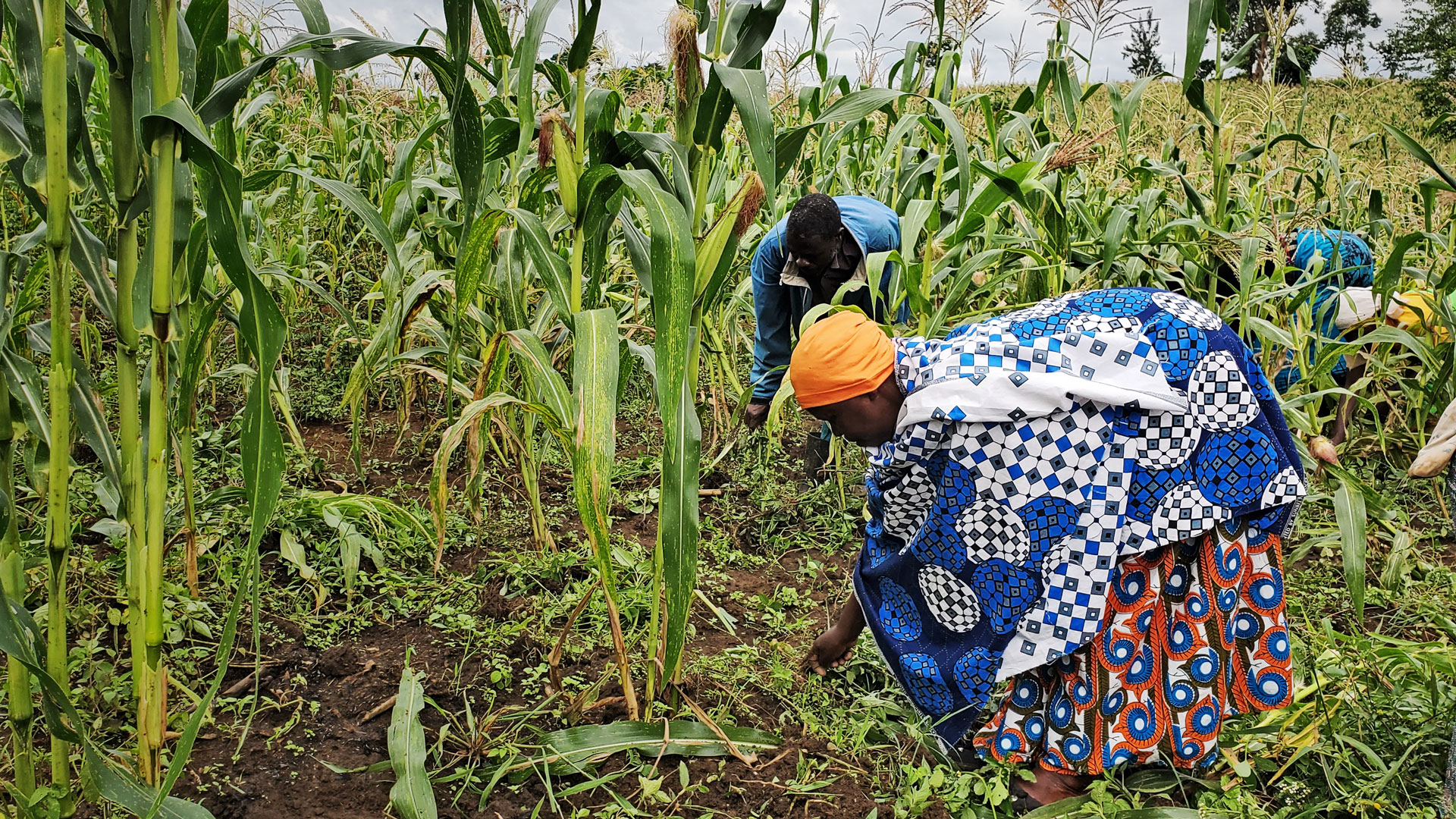Empowering smallholder farmers for sustainable maize production and increased incomes in Rwamwanja refugee settlement
Several smallholder farmers grow maize in Rwamwanja refugee settlement in Uganda. The product has growing markets in nearby areas. Still, due to low productivity and an absence of associative organizations or other platforms for sharing knowledge and empowering local farmers, the markets are not profitable.
Several opportunities to increase income, food security and self-reliance exist, yet the lack of skills in organizing the maize production and making it sustainable remains a challenge. Currently, local buyers – the so-called middlemen – buy the maize at low prices from the smallholder farmers. They add to its value by, for instance, drying or sorting and then sell the maize in towns for much higher prices. Some buyers are processors that grind the maize into flour and other bi-products, such as animal feeds.
Supported by our Food System Lab, the maize farmers will be organized into a strong association that can directly access the maize market without middlemen’s influence.
The Food System Lab Rwamwanja, coordinated by Finn Church Aid, addresses these challenges that refugees and Ugandan women are facing in the settlement by supporting self-sufficiency and community-based extension. Our Food System Lab empowers women smallholders and trains them in improving their maize production in terms of productivity, quality and sustainability, ultimately boosting their access to the maize market.
Supported by our Food System Lab, the maize farmers will be organized into a strong association that can directly access the maize market without middlemen’s influence. This will improve maize prices and smallholder farmers’ income and enhance their socioeconomic wellbeing and societal status.
In the refugee context, the income growth increases household consumption of other food products that complement the World Food Programme’s support of maize meal and beans. To put it simply: refugees earn more money and diversify their diets by affording more nutritious food.
Aiming to change the market system
The vision in our Food System Lab is threefold. Firstly, as the result of improved local extension structure, soil fertility is enhanced, and good maize farming practices are adopted. This, in turn, leads to improved maize yields.
Secondly, value addition through milling and packaging attracts premium price for the product.
Thirdly, by organising themselves better, the smallholder maize farmers can increase their negotiation capacities and thus tap into emerging market opportunities directly, without middlemen’s influence. Our Food System Lab will bring together relevant actors to identify best practices and learnings relating to setting up new livelihood activities in the refugee settlement and developing functioning and equal value chains and market linkages.
The government’s public extension system supports the activities by providing agro-technical knowledge to the farmers to improve maize productivity. The Food System Lab will also establish a Community-based Extension system using Village Enterprise Agents, maize farmers themselves.
Producers will be organized into collectives to sell in bulk and to negotiate prices. Input suppliers provide maize farms with seeds, fertilizers and other necessities related to production, while advisory agencies and NGOs train producers on production techniques. Smallholders can receive financing from micro-finance agencies.
Our Food System Lab will change the market system, making the market increasingly beneficial for low-income maize producers over the upcoming years. By changing the behaviour of market actors, the market works more efficiently and inclusively, responding to the needs of poor households and communities.
Village Enterprise Agents and smartphones improving the knowledge base and communication
One of the key approaches towards achieving increased productivity, sustainable practices and market access is to provide the farmers with the requisite training and on-farm extension support through a community-based extension structure, using a network of Village Enterprise Agents.
To disseminate agro-technical knowledge, the Village Enterprise Agents will be equipped with mobile phones pre-loaded with relevant agricultural content. Our Food System Lab develops an online dashboard to provide timely visibility of field activities, thus enabling timely information sharing, monitoring and learning. Stakeholders at any location will access the online dashboard through a username and password.
Introduction of smartphones in agricultural extension services in hard-to-reach rural areas in Uganda can enable communication with farmers, extension agents and managers in ways that were impossible before.

Photo: Sharon Shaba.
The adoption of smartphones in agriculture extension has occurred even more rapidly in developed countries than in Uganda. However, its adoption merits particular importance and attention because extension services in Uganda have been characterized by too-few field agents and a lack of communication support infrastructure and budget.
However, the smallholders – the majority of farmers in Uganda – are unlikely to have high levels of education (or could actually be illiterate) and generally with little experience operating mobile phones and related Apps.
These challenges can lead to underuse or abandonment of the technology if proper support is not provided. For this reason, Food System Lab Rwamwanja will combine these approaches in a structured system that trains local Village Enterprise Agents to become ‘professionals’, acting as liaisons to provide assistance and seek information on behalf of other farmers in their community.
This way of using technology combines the best of both approaches; the self-guided nature allows the user to tailor information to each farmer’s specific needs and situation. The organization and training of the Village Enterprise Agents mean that the knowledge they will provide can include up-to-date information to introduce smallholder farmers to new ideas.
Author: Elias Katareiha, Livelihood Program Officer, Finn Church Aid
This article was originally published on the Healthy Food Africa website.